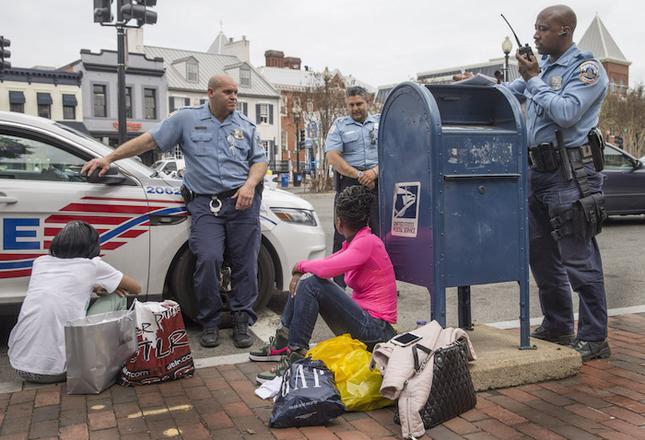Shoplifting in D.C. Needs to Be Reported
By • December 5, 2022 0 1933

Georgetown is back! That’s the happy comment by many residents and visitors this past weekend as they shopped in Georgetown’s decorated and well-stocked stores, sat in the filled cafes and restaurants and attended the many special holiday events. Unfortunately, also what is back and apparently increasing is shoplifting.
“We are seeing and hearing from our retail friends about a major tickup in shoplifting,” local shop owner Krista Johnston told The Georgetowner. “We notice many ‘casings’ going on and have had a few encounters ourselves. We’re always on the lookout.” There is no one prototype for a shoplifter, according to Johnston whose shop Ella Rue features valuable vintage clothes and accessories. “They are men, women, youths – all ages really.”
“Over half (56 percent) of small businesses in the retail sector say they have been victims of shoplifting in the past year,” according to a new survey released in late September by the U.S. Chamber of Commerce. “Fifty percent of small retailers say the issue has gotten worse over the past year, and 46 percent of them have been forced to increase their prices over the past year as a result of shoplifting. Shoplifters seek to profit by taking advantage of gaps in the law and by state laws that have been significantly loosened regarding the levels of prosecution that allow many thieves to avoid any prosecution altogether.”
“D.C. crime statistics actually show that prosecuted cases of shoplifting from Georgetown businesses are down this year – from 258 in 2021 to 202 to date,” said Matt Millage of Georgetown’s Business and Improvement District (BID) that held a meeting on public safety on Nov. 30. “But that’s the reported numbers,” said BID’S Operations Director John Wiebenson. “There may be many more incidents of shoplifting in Georgetown, but they must be reported. That’s the only way that the D.C. MPD will be able to respond with officers, tactical teams and other law enforcement procedures against shoplifting.”
In no case is it recommended that shop customers or staff get into a physical intervention with shoplifters however. “If you see a crime in progress, report it immediately to 911 — police can respond to an actual ongoing crime,” said Wiebenson. “Otherwise, it should be reported to 311 or online to the police.
“Be a good witness” is what one national chain has told its employees and customers, according to a report in The Guardian on August 25. “Retail employees who intervene in shoplifting face attacks from shoplifters and disciplinary action from their employers. Most stores have “no touch” policies where employees cannot touch the shoplifter or intervene to keep the thief from exiting the store, and most stores also prohibit employees from pursuing the shoplifters after they exit the store. Employees, including security guards, are no longer stopping shoplifters but rather supervising it.”
In D.C., there is a general theft statute that is distinct from the shoplifting statute, which applies to most instances of unlawful taking of property. Technically, the element of shoplifting will be included in the aspects of theft – that is, taking property from someone else without permission — and in theory, someone could be charged with both shoplifting and theft. Legally, shoplifting is a more specific type of theft, however, involving taking property from a business without the intent to pay for it, altering the price tag or the identification of that property, or taking it out of its packaging. It is a more narrow and distinctive type of crime. Punishment can include a fine and up to 90 days in jail.
But in practice, a shoplifting offense in the District is considered a less-significant and lower-level misdemeanor. Often, there is more opportunity in a shoplifting case to negotiate for a diversion program or some sort of alternative resolution short of a conviction than in other theft cases. It is unclear how the new police overhaul laws passed in November by the D.C. Council will affect the prosecution of shoplifting or may cause it to go unpunished and become an increasing urban cost of doing business.

